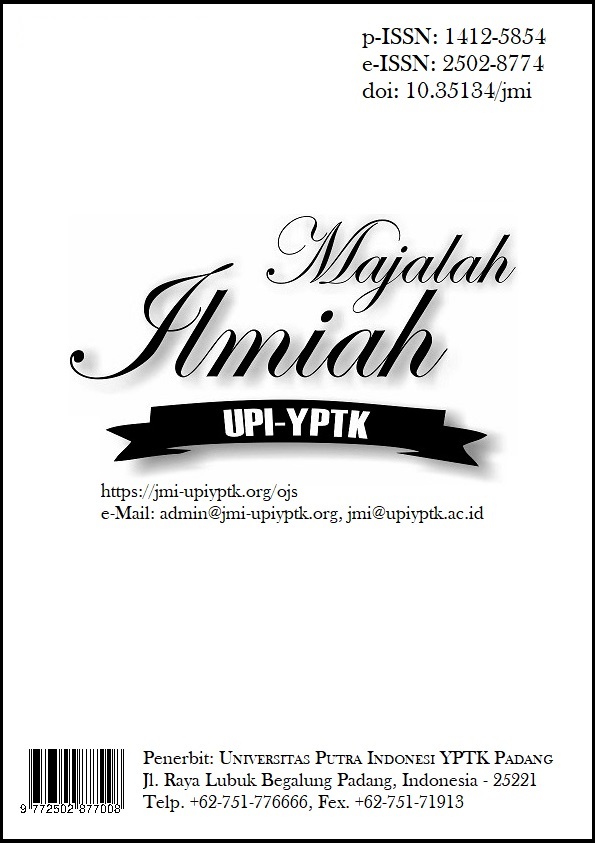Automasi Administrasi Digital dalam Peningkatan Pelayanan Nagari Ranah Pasisie
DOI:
https://doi.org/10.35134/jmi.v30i2.168Keywords:
automation, digital administration training, microsoft excel, participatory action researchAbstract
Information technology has developed into a necessity in various aspects, including the government. Proper use of technology will increase the efficiency and effectiveness of organizations, especially in public services. Currently, the Nagari Ranah Pasisie government is facing challenges in providing services to the community, especially in managing village data. This service research aims to assist village officials in using Microsoft Excel within digital administration systems. Microsoft Excel can help village administrators manage, store, and administer data. Participatory action research (PAR) divides this service research method into three stages: mapping, which includes the precondition stage and needs assessment through direct communication and focus group discussion (FGD); implementation, which includes the program planning and training implementation stages; and monitoring, which includes the evaluation and reflection stages. Village officials who are training participants receive questionnaires as part of the evaluation process. The questionnaire was calculated and analyzed using a Likert scale and scale range equations. The results of the questionnaire showed that the village officials gave a positive response to the implementation of service activities. However, there were still notes, such as the duration of training needing to be increased. The training will enable village officials to provide data management and administrative services more effectively and efficiently
References
Nugroho, F. P., Abdullah, R. W., Wulandari, S., & Hanafi. (2019). Keamanan Big Data di Era Digital di Indonesia. Jurnal Informa, 5(1), 28–34. https://doi.org/10.46808/informa.v5i1.65
Mukhsin. (2020). Peranan Teknologi Informasi dan Komunikasi Menerapkan Sistem Informasi Desa dalam Publikasi Informasi Desa di Era Globalisasi. TERNOKOM, 3(1), 7–15. https://doi.org/10.31943/teknokom.v3i1.43
Nilma, Nuzulah, R., & Mardika, P. D. (2023). SOSIALISASI DAN PELATIHAN APLIKASI SURAT MENYURAT DAN PENGOLAHAN DATA KAS RT.06 RW.02 KOTA DEPOK. Jurnal PKM: Pengabdian Kepada Masyarakat, 06(01), 110–115. https://osf.io/preprints/tq32y/
Putra, B. M., & Erlangga, R. A. (2023). The Utilization of Information and Communication Technology Systems in Good Government Management. 3(1), 10–12. https://doi.org/10.2991/978-2-494069-07-7
Dhiaaul Kusnaa Washilatul Arba’ah, Z. (2023). Information & Technology Audit of E-Government Using Cobit a Literature Review. JIKO (Jurnal Informatika Dan Komputer), 6(1), 21–27. https://doi.org/10.33387/jiko.v6i1.5606
OECD. (2019). Strengthening Digital Government. March, 1–8. www.oecd.org/going-digital/strengthening-digital-government.pdf
Fathony, R., Muradi, M., & Sagita, N. I. (2021). Pemanfaatan Teknologi Informasi Dalam Penyelenggaraan Pelayanan Publik Di Lingkungan Pemerintah Kota Bandung. Jurnal Agregasi : Aksi Reformasi Government Dalam Demokrasi, 9(2), 1–12. https://doi.org/10.34010/agregasi.v9i2.5581
Umaira, S., & Adnan. (2019). Pengaruh Partisipasi Masyarakat, Kompetensi Sumber Daya Manusia, dan Pengawasan Terhadap Akuntabilitas Pengelolaan Dana Desa (Studi Kasus Pada Kabupaten Aceh Barat Daya). Jurnal Ilmiah Mahasiswa Akuntansi, 4(2), 107–118. https://doi.org/10.37478/jria.v4i2.3908
Suksod, P., & Cruthaka, C. (2020). The relationship between human resources practices and organizational performance in pharmaceutical industry of Thailand. Systematic Reviews in Pharmacy, 11(3), 67–76. https://doi.org/10.5530/srp.2020.3.08
Amalia, M. R. (2024). The Impact of Digital Era 4.0 Transformation on Human Resources Management. Management Studies and Business Journal (PRODUCTIVITY), 1(1), 89–98. https://doi.org/10.62207/9btfqx28
Samsinar, S., Fatimah, T., Sakti, D. V. S. Y., & Ariyani, P. F. (2021). Pengembangan Kapasitas Teknologi Informasi Pegawai Kanwil DJP Jakarta Selatan II Melalui Pelatihan Ms. Excel Tingkat Dasar. Jurnal Karya Abdi Masyarakat, 4(3), 643–649. https://doi.org/10.22437/jkam.v4i3.11589
Maknunah, J., Dwi Mumpuni, I., Suvi Rahmawati, L., & Widayanti, R. (2021). Microsoft Excel Training for Data Processing for Vocational High School Students. Jurnal Dedikasi, 18(2), 20–26. http://ejournal.umm.ac.id/index.php/dedikasi
Sunardi, Auliana, S., Paratama, G. U., Setya, B. R. P., & Nugraha, A. D. (2024). Designing an Application for Direct Cash Assistance Allocation Using Laravel at Sepang District Office. ARRUS Journal of Engineering and Technology, 4(1), 100–111. https://doi.org/10.35877/jetech2720
Sulindawati, N. L. G. E., Lasmawan, I. W., Natajaya, I. N., & Yuniarta, G. A. (2021). An Analysis of Material Need and Development Digital Media in Learning Budgeting Accounting Study Program Undiksha. CLIQE ’21: Proceedings of the 5th International Conference on Learning Innovation and Quality Education, 1–8.
Mittal, P. (2020). Impact of Digital Capabilities and Technology Skills on Effectiveness of Government in Public Services. 2020 International Conference on Data Analytics for Business and Industry: Way Towards a Sustainable Economy, ICDABI 2020. https://doi.org/10.1109/ICDABI51230.2020.9325647
Sulindawati, N. L. G. E., Suharsono, N., Lasmawan, W., Natajaya, N., & Sunu, G. A. (2019). The implementation of a village financial administration teaching model through microsoft excel program. International Journal of Innovation, Creativity and Change, 5(6), 19–34.
Vaughn, L. M., & Jacquez, F. (2020). Participatory Research Methods – Choice Points in the Research Process. Journal of Participatory Research Methods, 1(1), 1–13. https://doi.org/10.35844/001c.13244
Cornish, F., Breton, N., Moreno-Tabarez, U., Delgado, J., Rua, M., de-Graft Aikins, A., & Hodgetts, D. (2023). Participatory action research. Nature Reviews Methods Primers, 3(1). https://doi.org/10.1038/s43586-023-00214-1
Keahey, J. (2021). Sustainable Development and Participatory Action Research: A Systematic Review. Systemic Practice and Action Research, 34(3), 291–306. https://doi.org/10.1007/s11213-020-09535-8
Pradana, F. A. P., & Mawardi, M. (2021). Pengembangan Instrumen Penilaian Sikap Disiplin Menggunakan Skala Likert dalam Pembelajaran Tematik Kelas IV SD. Fondatia, 5(1), 13–29. https://doi.org/10.36088/fondatia.v5i1.1090
Luthfie, S. M., Kurniawan, A. Y., & Yulianti, M. (2024). Sikap Konsumen Terhadap Produk Minuman Kopi “Nuansa” dan “Piccolo” di Kafe Tuju Banjarbaru. Jurnal Tugas Akhir Mahasiswa (JTAM), 8(1), 216–224. https://ppjp.ulm.ac.id/journals/index.php/fag
Downloads
Published
How to Cite
Issue
Section
License
Copyright (c) 2024 Majalah Ilmiah UPI YPTK

This work is licensed under a Creative Commons Attribution 4.0 International License.






